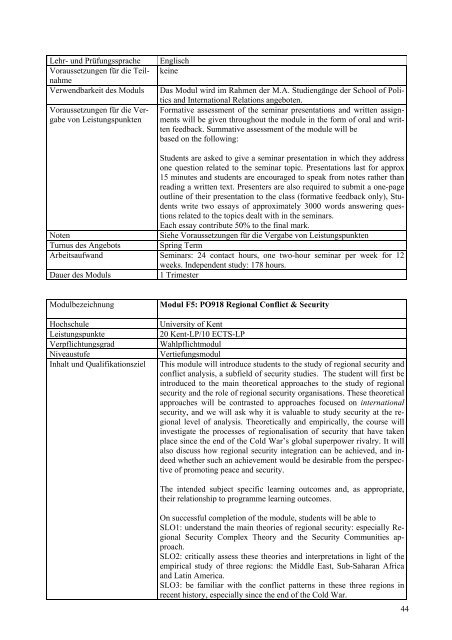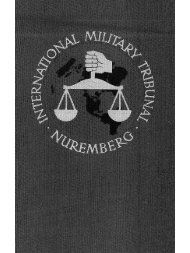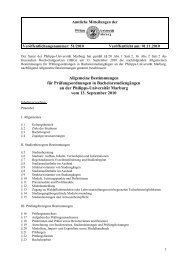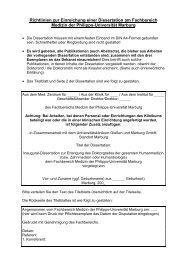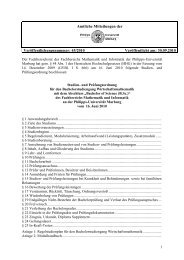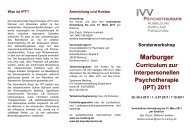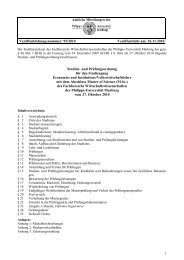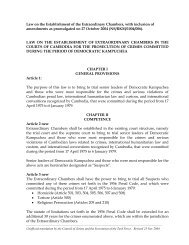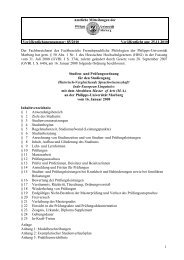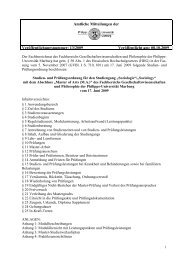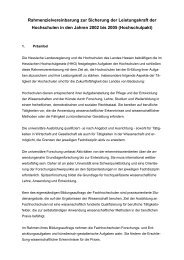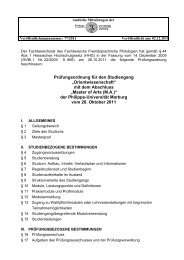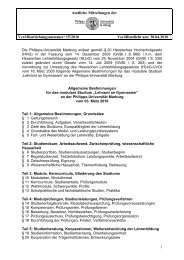Peace and Conflict Studies - uni-marburg
Peace and Conflict Studies - uni-marburg
Peace and Conflict Studies - uni-marburg
Create successful ePaper yourself
Turn your PDF publications into a flip-book with our unique Google optimized e-Paper software.
Lehr- und Prüfungssprache Englisch<br />
Voraussetzungen für die Teil- keine<br />
nahme<br />
Verwendbarkeit des Moduls Das Modul wird im Rahmen der M.A. Studiengänge der School of Politics<br />
<strong>and</strong> International Relations angeboten.<br />
Voraussetzungen für die Ver- Formative assessment of the seminar presentations <strong>and</strong> written assigngabe<br />
von Leistungspunkten ments will be given throughout the module in the form of oral <strong>and</strong> written<br />
feedback. Summative assessment of the module will be<br />
based on the following:<br />
Students are asked to give a seminar presentation in which they address<br />
one question related to the seminar topic. Presentations last for approx<br />
15 minutes <strong>and</strong> students are encouraged to speak from notes rather than<br />
reading a written text. Presenters are also required to submit a one-page<br />
outline of their presentation to the class (formative feedback only), Students<br />
write two essays of approximately 3000 words answering questions<br />
related to the topics dealt with in the seminars.<br />
Each essay contribute 50% to the final mark.<br />
Noten Siehe Voraussetzungen für die Vergabe von Leistungspunkten<br />
Turnus des Angebots Spring Term<br />
Arbeitsaufw<strong>and</strong> Seminars: 24 contact hours, one two-hour seminar per week for 12<br />
weeks. Independent study: 178 hours.<br />
Dauer des Moduls 1 Trimester<br />
Modulbezeichnung Modul F5: PO918 Regional <strong>Conflict</strong> & Security<br />
Hochschule University of Kent<br />
Leistungspunkte 20 Kent-LP/10 ECTS-LP<br />
Verpflichtungsgrad Wahlpflichtmodul<br />
Niveaustufe Vertiefungsmodul<br />
Inhalt und Qualifikationsziel This module will introduce students to the study of regional security <strong>and</strong><br />
conflict analysis, a subfield of security studies. The student will first be<br />
introduced to the main theoretical approaches to the study of regional<br />
security <strong>and</strong> the role of regional security organisations. These theoretical<br />
approaches will be contrasted to approaches focused on international<br />
security, <strong>and</strong> we will ask why it is valuable to study security at the regional<br />
level of analysis. Theoretically <strong>and</strong> empirically, the course will<br />
investigate the processes of regionalisation of security that have taken<br />
place since the end of the Cold War’s global superpower rivalry. It will<br />
also discuss how regional security integration can be achieved, <strong>and</strong> indeed<br />
whether such an achievement would be desirable from the perspective<br />
of promoting peace <strong>and</strong> security.<br />
The intended subject specific learning outcomes <strong>and</strong>, as appropriate,<br />
their relationship to programme learning outcomes.<br />
On successful completion of the module, students will be able to<br />
SLO1: underst<strong>and</strong> the main theories of regional security: especially Regional<br />
Security Complex Theory <strong>and</strong> the Security Comm<strong>uni</strong>ties approach.<br />
SLO2: critically assess these theories <strong>and</strong> interpretations in light of the<br />
empirical study of three regions: the Middle East, Sub-Saharan Africa<br />
<strong>and</strong> Latin America.<br />
SLO3: be familiar with the conflict patterns in these three regions in<br />
recent history, especially since the end of the Cold War.<br />
44


